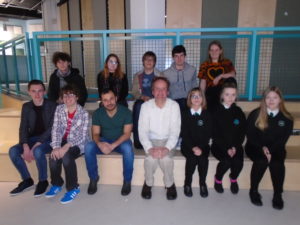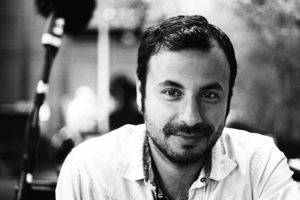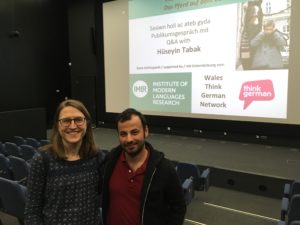Julian Preece and Anna Saunders report on the recent successful visit to Wales by film director Hüseyin Tabak
When I received an email from Hüseyin Tabak on Wednesday 7 March with the message ‘ich bin gleich in Swansea. Es hat alles super geklappt’ I was finally persuaded that the already famous young film director was really coming!
Plans for Hüseyin’s visit, which would see him work with numerous audiences from schools, universities and the wider public over three intensive days of activities, were first hatched the previous summer. Anna Saunders (Bangor University), the co-director of the Think German Wales network we founded together with assistance of the Embassy in July 2014, was enthusiastic. Having decided to extend an invitation to the man responsible for the film Das Pferd auf dem Balkon, which has proved so popular on the new WJEC AS and A level syllabus, the first challenge was to find his email address. I asked fellow film director Andreas Dresen, a Think German Wales guest in November 2014, but he could not tell us. At my request Professor Erica Carter (King’s College London) sent a message around the German Studies Screen Network. Soon a reply came in and it was positive. The German Embassy agreed to help cover his fee and expenses, supportive of the German Networks which the Cultural Attaché helped establish three years ago.
Pinning such a busy guest down to a date which suits all soon proved harder than tracking him down or securing the external funding. Hüseyin was busy in the editing studio – getting ready a new film about a female boxer called Gypsy Queen for release in the autumn of 2018. At Swansea’s Dylan Thomas Birthplace on the second evening in Swansea a select audience would be privileged to view some excerpts from a rough cut of this film. It is about Roma culture, which Hüseyin explained has interested him as a Kurd for many years, and not just because of the two peoples’ shared status as stateless nations. It is based around the story of a woman who boxes and is an outsider in contemporary Germany. It begins with a dramatic scene of the central character giving birth, apparently with no assistance except from her four-year old child whom she locks in another room. As in his other work to date, multilingualism appears to be at the heart of her life and experience of overlapping worlds.
By the beginning of December 2017, Anna Saunders, Hüseyin and I had finalised a date at the beginning of the following March. I informed German teachers in South Wales and received a number of excited responses from those teaching Das Pferd auf dem Balkon, from Porthcawl Comprehensive, Whitchurch High School in Cardiff, and all the way from Crickhowell on the Heads of the Valleys Road, requesting details and timings and expressing plans to come to Swansea to attend a workshop. I then wrote to the Embassy to say that we were ready to fill out the formal application form for funding, as previously discussed. A couple of days later a response came back, explaining that because no government was in place in Berlin, the September elections having resulted in an unusual stalemate, they were under instructions not to agree to fund new projects. This was a blow. We were expecting a free-lance artist to give up four days of his professional time and were planning to make him work hard traveling around Wales, from Swansea to Bangor. External support was critical. Then, just before Christmas (like in Das Pferd auf dem Balkon which ends with a Christmas miracle), I was at a meeting at the IMLR and heard that there were funds for projects taking place outside London. The rest, as they say, is history.
By mid-January we were in a position to plan the schedule. Cinema & Co on Swansea High Street, a new venue which is part of a regeneration programme affecting the city centre, were delighted to screen the film Deine Schönheit ist nichts wert on the first evening of Hüseyin’s visit. This is a more challenging film than Das Pferd auf dem Balkon, which was made with children in mind. It is mainly in Turkish (with German sub-titles) and is about a family of Turkish-Kurdish asylum seekers in Vienna and in particular the role of interpreters and translators in the life of a displaced family. Vessel, the twelve-year old boy at the centre of the film, is required to recite a German poem to his class and endeavours to get his favourite poem by the Kurdish poet who he is named after translated into German. He also wants to impress a female class-mate whom he takes to be Austrian but whose family in fact fled the war in Bosnia half a generation ago. My immediate problem was that the DVD had no English sub-titles and in order to understand the film you needed either Turkish (for 80% of the dialogue) or German (for the rest of the dialogue and the sub-titles). My first misjudgement was to assume that because a DVD has no sub-titles, subtitled versions of the film do not exist. ‘Always ask the film-maker’, Hüseyin advised me when he got to Swansea. ‘We always have other versions of films’ – in this case there are subtitles in various languages, including English.
We publicised the screening and were delighted with an audience of nearly 40, from the local Turkish and Kurdish communities, the city of Swansea, Swansea and Cardiff Universities and many other places. The film was well received and the discussion with Hüseyin went on for more than half an hour. He spoke excellent English, as well as German and Turkish. He told us about how the events depicted in the film, including the deportation of the Bosnian family, were based on reality. He explained how he came to study cinema under Michael Haneke at the Filmakademie in Vienna. Haneke commented on his films during the post-production phase and he took his advice very seriously. He still intends one day to finish his Masters after many delays. The discussion predictably turned to politics. The situation in Kurdistan is evolving all the time, but currently the Kurds were getting hit from all sides, especially Turkey. In Austria, which he described (as a German) as a slightly strange country, there had always been a right-wing presence and he could notice how people reacted to his appearance. Growing up in Ostwestfalen in Germany, where his parents worked in a factory, he had never noticed such looks, though he had friends who reported differently. This all changed with the Migrant Crisis of 2015, when suddenly he was taken to be a foreigner, a refugee, an undeserving alien. He predicted in conversation later that many of the migrants who came to Germany since the summer of 2015 would face the same fate as the Bosnian family in his first feature film, settling in Germany with their families, living there for years, only to be ‘sent back’ a decade or more later. He explained how his role models were Charlie Chaplin and Yilmaz Guney, the legendary Kurdish director who won a Palme D’Or at Cannes in the early 1980s. He credited both Chaplin and Guney at the end of all his films. Guney is the subject of his next film, a documentary which took him some seven years to research and make, entitled The Legend of the King. It was premiered at the Toronto Film Festival and is due to open the Kurdish Film Festival in London on 13 April 2018 and screened again at the East End Festival a month later. Hüseyin’s first long film was also a documentary on the subject of the ‘Homeless Word Cup’, featuring a team made up of vulnerable young men from a variety backgrounds who represented Austria at the 2008 tournament in Australia.

Hüseyin Tabak, Julian Preece & pupils from Stanwell Comprehensive, Cardiff and Ysgol Gyfun Ystalyfera
The first evening was a success. The next morning we were expecting just over 20 sixth-formers from three different schools to descend on the Swansea campus in the newly refurbished Talisien Arts Centre to hear about the film they were studying for A or AS level, Das Pferd auf dem Balkon. They were from Porthcawl, Stanwell in Cardiff and Ystalyvera in the Swansea Valley, a Welsh-medium school. I prepared them for a Q&A with Hüseyin, followed by showing them extracts from the film which he commented on. The students and their teachers were very attentive and prepared some unexpected questions: what happened to the horse? Which character would you leave out if you had to leave one out? They spoke and listened to German for three hours, their concentration levels barely dipping. There is a film of an interview which I recorded with Hüseyin later in the day which recapitulates much of the morning’s conversation. It can be found on the Think German Wales website
After talking non-stop for two hours, Hüseyin returned to his hotel. His mind was on other projects and he needed time with his lap-top. He turned up again a little late for a screening of Das Pferd auf dem Balkon to university students and colleagues. This was not so well attended, but appreciated nonetheless by those who were there. Hüseyin later expressed some disquiet at the venue for a screening, which only opened the previous week, because the architects had designed it so that people can wander in and out or at least take a peek at what was going on in the performance space.
With colleagues Ute and Christiane and a Jeremy, a postgraduate student, we hurried to a meal before heading to the Dylan Thomas Birthplace for a final public conversation. I was also planning to show clips from his three films to appear on DVD to date which I had prepared earlier in the week and sent on to Geoff Hayden who owns and runs the Birthplace as a tourist attraction and mini cultural centre. The evening was a sell-out, albeit the venue has a capacity of 25. First the two of us were interviewed by Swansea Bay TV, who broadcast the result twice the following Sunday morning. Hüseyin then reacted to prompts from me and the clips, which he had not previously seen, discussing animatedly with members of the audience who were not slow to express comments. Whereas for me the highlight of the visit was undoubtedly the workshop with the sixth-formers and their teachers, this is the occasion, in Swansea at least, which he found the most rewarding. After a break he suggested that he show us extracts from Gypsy Queen which his editor in Germany emailed to him. He wanted to test reactions and the audience stayed in their seats until nearly 10.30 pm, aware that they were taking part in a very rare moment: sitting in the former sitting room of the Anglo-Welsh poet listening to a Kurdish-Turkish-German film director explain his latest work. Dylan Thomas’s father had famously not spoken Welsh with his son because like so many Welsh-speaking parents he wanted his son to get on in the world and saw Welsh as a hindrance. Hüseyin was interested in the role of the Welsh language in contemporary Swansea, noticing the bilingual signs on his arrival. He told us how his father was fluent in Kurdish because he grew up in a village, whereas his mother spoke very little because she came from a town where Kurds were frightened to speak their own language. Consequently, he himself did not speak much Kurdish. We were on the subject of politics again and he told us about having been interviewed by police in the middle of the night on a recent visit to Turkey and how an uncle who has the same name had been hauled in to a police station and asked questions about film-making. His mistake on his last visit was to show his Turkish passport at the hotel, rather than his German one. He was determined to return and not show fear, but the audience warned him to be careful.
We finished the evening in a state of some satisfaction at a day well spent and agreed to meet the following morning in time to set off by car for Bangor. We set off at 9.45 am but the trek north took longer than anticipated, so we arrived in Bangor too late for a planned seminar at 3pm.
Professor Julian Preece, Chair in German, Swansea University
**********************************************
Hüseyin and Julian were clearly both relieved to arrive in Bangor after the long drive north and Hüseyin was understandably frustrated that one of our planned events couldn’t take place: a seminar with students on careers in the creative industries in Germany and Austria. However, students who missed this event came to the evening film showing and were able to engage with Hüseyin both during the Q&A and afterwards and thus still benefit from his expertise.
In the afternoon, we were pleased to welcome 17 pupils and teachers from three schools in North Wales: Ysgol David Hughes (Menai Bridge), Ysgol Eirias (Colwyn Bay) and Emrys Ap Iwan (Abergele), who attended a workshop with Stefanie Kreibich, a postgraduate student at Bangor. The pupils and teachers were excited at the prospect of hearing Hüseyin speak about Das Pferd auf dem Balkon later in the day and were enthusiastic about the event as a whole. Given that there are very few published materials on the film, this was an extremely valuable opportunity to explore the film in detail and gain insight into the directors’ motivations, as well as hear about the production process. During the workshop pupils also prepared questions to ask Hüseyin during the Q&A.
The last event of the three days was a public screening of Das Pferd auf dem Balkon in the cinema in Pontio, Bangor University’s new high-profile arts and innovation centre. This was Hüseyin’s favourite venue and the best attended of all the events, attracting school pupils, university students and members of the public from academic and non-academic backgrounds. With the help of the Cinema Manager, Emyr Williams, we introduced Hüseyin tri-lingually in Welsh, German and English before the film began, and enjoyed an animated Q&A session after the film. Audience members were eager to find out more about Hüseyin’s work with young and often inexperienced actors, in particular Enzo Gaier, whose portrayal of a 10 year-old boy with Asperger’s had clearly moved many – some with personal experience. Others quizzed Hüseyin on his career path, and were interested to learn how much he still values his very early experiences of working on set as a general dogsbody. For him, these experiences remain central to shaping the way he works with his team and relates to his actors. The discussion also touched on Hüseyin’s role models and inspiration, his present and future projects, and the importance of storytelling. The evening proved inspiring for budding filmmakers and German enthusiasts alike, as well as for those with personal experiences of Asperger’s and the issues raised in the film. It was, in brief, a resounding success, and we are very grateful to the IMLR, as well as the Universities of Swansea and Bangor, for making this possible.
Dr Anna Saunders, Head of School of Modern Languages, Bangor University | Senior Lecturer in German


